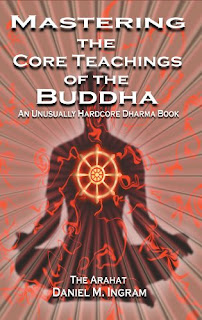 |
| Noble disciple Ven. Janeyyacara |
It's a useful rule of thumb, but it is sometimes used as a hammer to shut others up. There are enlightened individuals walking around among us, going about their business. Why is that? "Awakening" (bodhi) purifies view, not personality. They may seem to be just as they were before.
 |
| One will look the same as before realization. |
Included among these are ordinary laypeople attained to any of the stages of enlightenment (all four or seven of them, depending on how they are classified, either using the Path of Purification or the more detailed Path of Freedom systems. We prefer the latter classification, but the former simpler standard is much more popular.
It hardly matters who is or isn't attained to eminence, except in terms of karma -- as what is done to them carries far more weight than what is done to ordinary worldlings of all kinds. The reason it is important is that if one of them teaches then that individual may be able to guide one all the way to a similar attainment or beyond. A stream enterer (sotapanna) teacher would seem to be more valuable than an extraordinary scholar. Why?
There seems to be some entrainment, modeling, or invisible "transmission" of something that results from practicing in line with the advice of someone who has actually reached the ultimate goal of liberation.
Perhaps such teachers are living examples of the possibility in this decadent age (kali yuga), or perhaps it is just common sense that training under a master and practice is better than training by book and theory.
But how does anyone ever find an enlightened teacher? There's the rub. The common answer seems to relate to karma. "When the student is ready, the teacher appears." However, a teacher appearing does not necessarily mean one is ready to summit. But it is nonetheless good to make progress for the long run. (Beware of false teachers who attempt to take advantage of gullible aspirants. Caveat emptor.)
One will not be able to tell who is or isn't attained. This is really true. How true it is, one will never know until one meets it in person. This we vow to readers. By thinking, "Oh, I'll know," one will miss it. By thinking, "That person couldn't be," one may miss it.
We have met awakened teachers. There was no halo, no nimbus, no aura, no radiance. Brilliant teachers who could answer in depth in an instant did not mean they themselves had known and seen the liberating truth. This is just the way it is. But remain sensitive to the possibility, and merit/good karma may just lead to the doorstep of the wise. Or strive to find such a person. Here's one: Venerable U Jāneyyācāra.
 |
| Mastering the Core Teachings (revised ed.) |
Back in January of 2018 at Bhikkhu Bodhi's former American home-temple, Bodhi Vihara in New Jersey (which was not named after him), there was a 10-Day Samatha & Vipassana ("Stillness & Insight") Meditation Retreat. It was conducted by Ven. U Jāneyyācāra (U, pronounced \oo\ is a Burmese honorific meaning something like "sir").
Ven. Jāneyyācāra is a senior member of the Saṅgha Committee of the Pa-Auk Forest Meditation Center (main) in Mawlamyine, Mon State, Burma (Myanmar). He was born in 1981 in Myanaung and ordained as a novice monk (sāmaṇera or "little samana") at a Buddhist monastery in Myanaung, on June 19, 1997.
Bhante received his higher ordination as a full wandering ascetic or monk (bhikkhu) on November 20, 2000, at Kan-Oo-Zay-Ta-Wan Monastery in Rangoon, where he studied Buddhist Pāli language studies.
He passed the Sasanadhaja Dhammacariya examination in 2006, held by the Department of Religious Affairs, Ministry of Religious Affairs, Government of the Union of Myanmar, and was awarded the title of “Teacher of the Dharma in the Buddha's Dispensation” on July 18, 2006.
This is equivalent to a B.A. in Buddhist Pāli Studies and confers the title of “Dharma Teacher.” He became an official teacher of the Pāli language at Maha-Su-Kha-Ra-Ma Monastery in Rangoon in 2006.
Ven. Jāneyyācāra went to Pa-Auk Forest Meditation Center (main) in 2010 to learn and practice samatha (calm) and vipassanā (insight) meditation under the center's abbot, Ven. Pa-Auk Sayadaw.
He also trained under Ven. Pa-Auk Sayadaw during a six-month intensive meditation retreat in 2010 and a four-month intensive meditation retreat in 2013.
Bhante [because of his attainments, not that anyone would ever say so] was appointed on June 2014 by Ven. Pa-Auk Sayadaw to be a teacher at Pa-Auk Meditation Center in Singapore.
Bhante spent the Rains Retreat (Vassa) 2015 at Pa-Auk Forest Meditation Center (in Maymyo), where Ven. Pa-Auk Sayadaw was teaching an intensive meditation retreat for advanced meditators.
Bhante became the abbot of Shwe Nyaung Pin Pa-Auk Tawya (Myanaung) in 2015 and spent his Rains Retreat there in 2016.
Bhante has given Dhamma talks and taught meditation retreats in Burma, the USA, Malaysia, Singapore, Indonesia, Vietnam, and China.
He speaks Burmese and English. More



No comments:
Post a Comment